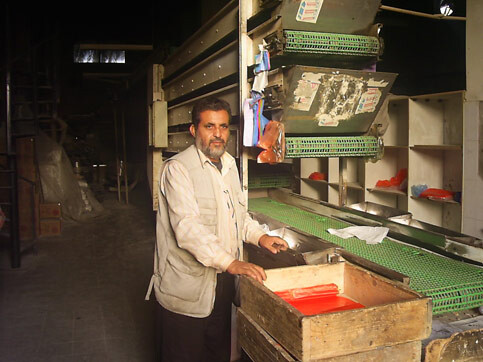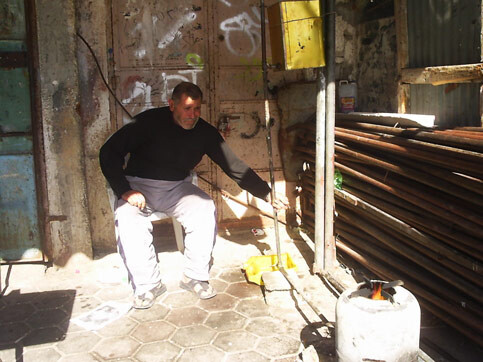Gaza Strip 26 November 2008

Mustafa al-Banna’s son, Hussam, stands in his father’s idle bakery in the Gaza Strip. (Rami Almeghari)
Israel’s 17-month siege, tightened over the past three weeks, has forced Palestinians to find other ways to meet their basic needs. Because Israel has closed border crossings into Gaza, the 1.5 million residents lack many essential supplies including food, medicines, fuel, cooking gas, and now, electricity. Even Gaza’s bakeries, which supply bread to hundreds of thousands of people in the besieged coastal territory, have been forced to shut down due to lack of gas and prolonged blackouts.
Mustafa al-Banna, 70 years old of Deir al-Balah, owns al-Banna Bakery, the largest bakery in central Gaza Strip. He explained that “We have been staying idle for the past three days as we are unable to bring cooking gas from nearby stations. Before this closure, we used to make 12,000 pieces of bread per hour, but in the past two weeks, our production capacity has become much less than half.”
The closure of bakeries impacts all sectors of society, as they also provide bread to hospitals, local community organizations, and schools. Mahdi Temraz, 32 years old, provides bread for 4,000 schoolchildren at two schools along Salah al-Din road, Gaza’s main thoroughfare. He complained of his inability to provide breads for the children stating that “For the third day consecutively now I come to this bakery and ask about bread, but there is none. Really I can not handle this situation as the children should have their morning meal, as designated by UNRWA [the UN agency for Palestine refugees].”
In a special interview with EI, John Ging, Director of UNRWA’s operations in the Gaza Strip decried the current conditions in Gaza, stating that “I am seeing here first hand, that the innocent civilians, 750,000 children in Gaza, are paying a severe humanitarian price for the political failure that has given rise to this conflict and for the conflict itself.” He added that “UNRWA’s responsibility is to provide human development of the next generation through our schools, we have 200,000 children in our schools. We are to provide humanitarian assistance, medical care, primary health care to a million refugees, food assistance and other emergency support to over half a million who are destitute.”
Meanwhile, due to the lack of cooking gas, fuel, and electricity Palestinians have been forced to devise other means to feed their families. Abu Abdallah, 57 years old from the Maghazi refugee camp, has collected some used small water pipes, a vessel and a second-hand gas canister, in order to roast bread for his 12-member family. He explained that “This oven is an old-type way of cooking, I recall that my family used such an oven about 50 years ago. But now as you see, I am forced to resort to this old oven, in order to cope with the lack of cooking gas.”

Abu Abdallah in the Maghazi refugee camp. (Rami Almeghari)
Abu Abdallah noted that this oven consumes less fuel than the regular cooking gas canisters, adding that “You can cook, roast breads or make any other meal, using such an oven. All you need is approximately five gallons of gasoline every four weeks.” Abu Abdallah stated that because of the scarcity of gas, he has been asked by several others to design a similar oven, including owners of local restaurant owners and vendor carts for selling toasted peanuts.
Mohammad Hammad, 30 years old, another Gaza resident lives with 15 family members. For the past couple of months, he has a fire wood-stove for cooking due to the lack of gas. He explained that he could no longer use the wood stove since “no wood is entering Gaza because of the closure of crossings. What I can say, we are running a very strict daily life.”
In June 2007, Israel imposed the blockade on Gaza after Hamas seized control of the territory amid factional fighting with forces loyal to Palestinian Authority President Mahmoud Abbas. An Egyptian-brokered ceasefire negotiated between Israel and Hamas has been in place for the past five months. Under the terms of the ceasefire, Israel was supposed to lift the Gaza blockade gradually, but it has not done so. The ceasefire was broken on 4 November, when Israeli occupation forces launched an incursion and air attacks into the central Gaza Strip that killed six Palestinians. Palestinian resistance groups retaliated for the killings by firing rockets at nearby Israeli towns. Israeli officials have stated that the borders will remain closed until rocket fire ceases.
Rami Almeghari is contributor to The Electronic Intifada, IMEMC.org and Free Speech Radio News. Rami is also a former senior English translator at and editor-in-chief of the international press center of the Gaza-based Palestinian Information Service. He can be contacted at rami_almeghari A T hotmail D O T com.
Related Links





